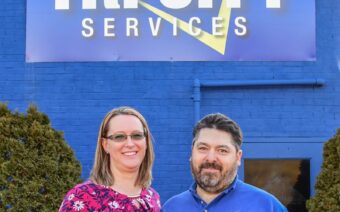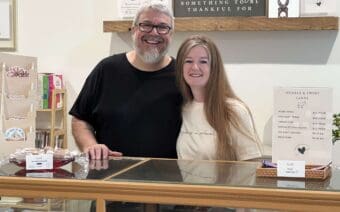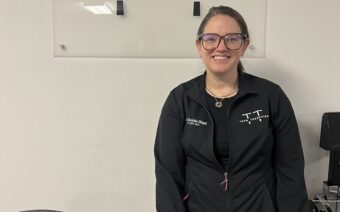
February 5, 2024
PORTAGE – In the wake of Energizer’s recent announcement to shut down its Fennimore and Portage plants by the end of the year, a new company is making its way onto the scene, with a new kind of battery to set itself apart.
Wisconsin Battery Co. (also known as WinBat), a research, development and manufacturing startup owned by Sustainable Communities Corp. – a nonprofit regional economic development organization based in Ohio – will be making hemp carbon batteries.
An alternative, Jeff Greene, president and CEO of the battery company, said to lithium-ion batteries.
“To mine lithium, you’ve got to destroy many acres of Earth,” he said. “It’s the equivalent of strip mining, if you will. Then using a lot of local, minor-aged manual labor to pull it out, destroys the community and destroys the health of the people that are doing it.”
Lithium, Greene said, is also finite, and “all in all is a bad chemical.”
Though the makeup of WinBat’s batteries will not look different than the typical AA, AAA, C and D batteries, Greene said the components inside the battery will be much more sustainable.
The company will be using the fibrous, woody pulp from hemp – “which is the best (part of the plant)” – which he said allows the batteries to store even more energy.
“Our product – the way our scientist explained it – traditional carbon that is not hemp versus hemp carbon, he related it to a Motel Six versus the Ritz Carlton,” he said. “The electrons at the Motel Six – they want to leave quickly. Whereas the electrons that go to the Ritz Carlton – they want to stay and go to the spa.”
Which Greene said means hemp carbon batteries will last longer, and therefore cost less in the long run.
How things came to be
Greene said he has been working in the hemp space for more than half a decade.
Then, Michael Sauvante, managing director and chairman of Sustainable Communities Corp., reached out.
“Michael started with, ‘Jeff, they’re closing down two Energizer plants. What do you know about batteries?’” he said. “My history has been hemp for the last six years, and out of fortune, one of my former employers asked me to do a deep dive into hemp to figure out what it could be used for.”
In the back of his mind, Greene – who also serves as the director and legislative and government relations advisor of Sustainable Communities Corp. – said he remembered a student at the University of Chicago who had made a hemp battery for a science project.
His interest piqued, Greene said he decided to look further into hemp carbon batteries.
“I told Michael to give me a few days, to do some due diligence, and with the beauty of Google these days, I was able to find Dr. (Deyang) Qu, who is based (at the University of Wisconsin-) Milwaukee and Dr. Sheldon Shi, who is based (at the University of) North Texas,” he said. “I got those two guys on board with us.”
Greene said he called Sauvante the next week and said, “‘there’s hemp carbon technology I think we could do – let’s start putting together a business plan and see if it’ll work.’”
Since then, Greene said “the rest has been a roller coaster of ups and downs.”
For nearly six months, he said they reached out to Energizer to try and work with them to either take over the buildings and become a research and development arm to the company – letting them distribute what Wisconsin Battery Co. would make – or let WinBat buy the Rayovac name.
Greene said, unfortunately, they “continued to get stonewalled by Energizer.”
This led the WinBat team to reach out to the mayor of Portage, Mitchel Craig, to see if there were any other properties available.
Luckily, Greene said there were 17 acres available in the Portage Industrial Park – making it a great spot for construction of the new 100,000-square-foot battery manufacturing plant.
“This is step one of our long-term strategy,” he said. “(The new building is) a bit smaller than the current Energizer plant, but it’s more efficient. It’s going to be better laid out.”
The WinBat plant is expected to be finished and operational by Q1 of 2025, Greene said, with plans to open a second location in Fennimore in the future.
The plant, Greene said, will be making size 13 and 312 hearing aid batteries, AA and AAA, C, D and 9 Volt batteries.
Greene said the company already has inquiries from other businesses about purchasing from them.
“I (recently) got an email from a local manufacturer that is going to be wanting to buy our batteries,” he said.
On top of finding a location for the future plant, Greene said WinBat needed both Portage and Fennimore to come to a resolution to advance its Industrial Revenue Bonds.
Thankfully, he said both cities approved of the resolution.
A benefit corporation
Outside of creating a more sustainable form of energy with hemp carbon batteries, Greene said it’s WinBat’s mission “to also (benefit) the community.”
One way of fulfilling this mission, he said, is by hiring former Energizer employees who will be laid off with the two plants closing.
“Part of what we’re seeing right now, is we’ve got a time between when we start and when Energizer lays people off,” he said. “We’re working with both Southwest Wisconsin Technical College, as well as Madison College to put together classroom training so they can be engaged during this downtime.”
Not only will that help future Wisconsin Battery Co. employees, Greene said it will also benefit the participating trade schools.
The company, he said, also plans to put together an incubator program at Madison College for retirees if they want to come back into the workforce and learn something different.
Craig said the company projects that within six years, they will have 600 people working at the new facility.
He said another part of WinBat’s strategy as a benefit corporation is becoming a generational employer, after discovering some of the company’s future employees are third- and fourth-generation workers.
“We’re trying to do this by touching people from the time they’re born until the time they decide to move on,” he said. “In some (way), they’re going to know who Wisconsin Battery Co. is.”
Craig said one way to keep employees on board – and focus on their well-being – is by offering daycare for those who have children.
“Both the Fennimore and Portage facilities, we expect to have subsidized daycare facilities either on-site or nearby so we can (have) young parents who want to work,” he said.
Greene said WinBat also plans to have a convenience store of sorts at each plant where employees can buy produce and other food items from local farmers.
To continue to be active in the community, Craig said the battery company also plans to bring in international customers to Portage to showcase its products, as well as sponsor other organizations in the area – such as the Portage Curling Club.
“We’ll certainly sponsor a curling team in the tournament,” he said. “We’re going to be active in the community.”
A sustainable future
The groundbreaking for Wisconsin Battery Co.’s Portage location is set to happen April 23, but Greene said the company is already looking to the future in several different facets – one of them being expanding.
“There’s another 24 acres adjacent to (our 17 acres) that is currently owned by a Pittsburgh company that is most likely not going through with its plans,” he said. “They have until 2028 to either do those plans or give the property back. We expect that by 2028, we’ll have that 24 acres and be able to expand.”
The company hopes to also expand the battery offerings it has.
“In the next phase of our development, we’re going to start making OEM (original equipment manufacturer) batteries for Milwaukee Tool or Ring, those types of businesses,” he said. “Hopefully, we’ll engage with them to make batteries for them, (as well as) military batteries and then graduate to EV batteries for vehicles.”
Once WinBat’s Portage location is open, Greene said his “ultimate goal is for every battery we sell, we recycle a lithium-ion battery.”
“So that – essentially – we’re taking a lithium battery out of cycle every time we put one (of ours) out there,” he said.
WinBat will be able to do this, Greene said, thanks to Qu, who knows how to recycle lithium batteries to make fertilizer.
Greene said he recently discovered that 60% of fertilizer in the world is manufactured in Ukraine, and due to the ongoing war in the country, there have been supply chain issues – meaning the price of fertilizer has almost doubled.
Which is why, he said, WinBat plans to start the process of recycling lithium-ion batteries quickly after the facility is up and running.
“Hopefully, that supply chain issue will resolve itself at some point and Ukraine will become the fertilizer capital again,” he said. “But in the meantime, maybe we’ve got enough headwind to move forward and do something. That will be building two or building three before we get there.”
Greene said the battery company will also be researching sodium ion batteries – another better alternative to lithium ion – for mass production in 2025 or 2026.
To learn more about Wisconsin Battery Co., visit winbat.co.
 Wisconsin Aluminum Foundry celebrates 115 years of manufacturing
Wisconsin Aluminum Foundry celebrates 115 years of manufacturing A new standard in electric refuse and recycling collection
A new standard in electric refuse and recycling collection








